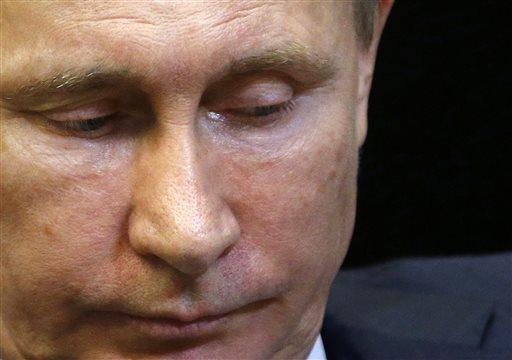"Putin's vision is much more global than the conflict in Syria"
With all due respect to America and Europe, the dominant player in the Middle East today is Russia. More specifically, the most important figure is the president of Russia, Vladimir Putin. What's going on inside Putin's head? Amir Rapaport's column
Amir Rapaport | 27/11/2015

With half-attention, the Israeli defense establishment has followed the developments in the Sinai this week, where the Egyptian army wages war against the Islamic State organization, after the downing of the Russian aircraft taking off from Sharm el-Sheikh.
Also the pressure exerted by ISIS, from Iraq to the borders of Jordan, is very disturbing to Israel. If the kingdom will fall, ISIS will arrive to Jordan's long border with Israel, from Eilat to the Golan Heights, but this horror scenario is still considered far.
Now, the main battlefield is in Syria, where the downing of the Russian Sukhoi jet on Tuesday by a Turkish fighter jet (which was probably equipped with Israeli technology, which was sold to Turkey during the flowering of relations between the countries) was seen as a surprise.
The downing of the jet could have immediate impact on Israel: It will be the catalyst for bringing to the region advanced Russian systems, including possibly an S-300 missile defense system, which will reduce IDF's air superiority in the region, sooner or later. The IAF cannot continue to take to the air without having to consider the growing Russian presence in Syrian territory. By the way, the Russians plan to sell Iran the S-300 system, with an Iranian promise that it will not get into the hands of Hezbollah.
Meanwhile, the bombings by US and European planes, mainly France, of ISIS targets in Syria and Iraq, are expected to increase following the attacks in Paris, particularly by attacking tankers and gas production facilities, to eliminate the sources of economic income of the Islamic State.
But with all due respect to America and Europe, the dominant player in the Middle East today is Russia, which sends more ships and more aircraft to Syria. More specifically, the most important figure is the president of Russia, Vladimir Putin.
By the way things looked this week, the Russians will increase the fighting in Syria. The entanglement with Turkey occurred because of their relentless bombings of villages near the Turkish-Syrian border. The bombings only prove that Russia is not focusing its attacks on ISIS, as it declares, but is working systematically to remove the military pressure of various rebel groups off Bashar al-Assad, on the way for a new political solution in Syria. Europe has an enormous interest in obtaining some sort of solution; bring an end to the civil war in Syria, hoping to stem the tide of refugees flooding the continent.
Inside Putin's Head
What goes through the head of Vladimir Putin? One of the greatest experts for Russia in Israel is Yakov (Yasha) Kedmi, the head of the "Nativ" organization that associate with Soviet Jews. According to Kedmi, "(both) the West and Israel are completely wrong understanding of Putin's mind."
Kedmi further says that "Putin's vision is much more global than the conflict in Syria. The conflict there is merely a demonstration of the huge military moves that Russia has made in recent years, including the launching of cruise missiles off small ships in the Caspian Sea and huge investments in intercontinental missiles and even in tanks equipped with active protection systems.
"In recent years the Russians have started thinking that the United States is working to bring about a regime change in China and Russia and weaken China economically. From their perspective, the Americans fear that Russia and China would undermine their global supremacy, and Putin has changed the Russian strategy. The first move of his was to restrain the American influence through the war in Georgia, then the decision he made that NATO will not progress further east from Poland, and he also went out on a campaign against Ukraine.
"All the moves are intertwined. In fact, since 2013, Russia is (taking part in) a massive arms race, and is following with great interest after American moves to place thermo-nuclear missiles in Europe.
"The Russians have devoted great effort to develop a response to American supremacy. At sea, for example, they built new submarines and strategic missiles. Last year, Russia exported more planes than the US.
"This year, they are producing 240 aircraft, airplanes and helicopters. Russia has decided to answer the supremacy of the US by the year 2018 and is continuing with its plan. Therefore, the developments in Syria are part of a very broad global picture. The Russians have even developed missile defense systems. The Americans were amazed to discover that they do not leg behind them in any area. The Russians are about to introduce a missile that can go up to 11 thousand miles per hour, has unlimited range, and can be launched from anywhere.
"Now, the Russian strategy is to make it clear to the Americans that in any future entanglement in Europe, their response will be in Los Angeles and Chicago. The Cold War is literality back."
Still, how does this relates to what is happening in Syria?
"The new Russian military capability in terms of aircraft has reached maturity. They also insist on having their ports off the shores of Syria, and they utilize the US incompetence and the fact that the surge of refugees in Europe has created an expectation in many countries that Russia will be put things back into order. They reached an assessment that in the current reality, the Americans will accept any solution they impose on Syria. Apparently, their assessment was justified, but it is impossible to understand what drives Putin in Syria without knowing the big picture."
Inga kommentarer:
Skicka en kommentar